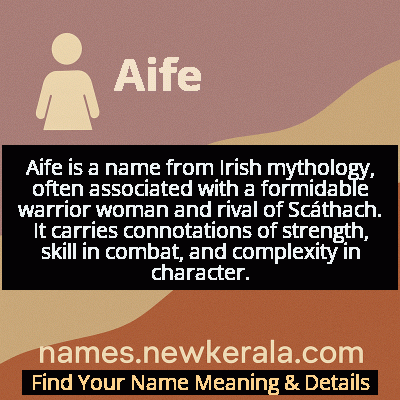Aife Name Meaning & Details
Origin, Popularity, Numerology Analysis & Name Meaning of Aife
Discover the origin, meaning, and cultural significance of the name AIFE. Delve into its historical roots and explore the lasting impact it has had on communities and traditions.
Name
Aife
Gender
Female
Origin
Celtic
Lucky Number
3
Meaning of the Name - Aife
Aife is a name from Irish mythology, often associated with a formidable warrior woman and rival of Scáthach. It carries connotations of strength, skill in combat, and complexity in character.
Aife - Complete Numerology Analysis
Your Numerology Number
Based on Pythagorean Numerology System
Ruling Planet
Jupiter
Positive Nature
Optimistic, inspirational, and creative.
Negative Traits
Scattered, exaggerating.
Lucky Colours
Yellow, gold, purple.
Lucky Days
Thursday.
Lucky Stones
Yellow sapphire.
Harmony Numbers
1, 2, 9.
Best Suited Professions
Arts, writing, communication.
What People Like About You
Creativity, optimism.
Famous People Named Aife
Aife (Aoife) MacMurrough
Irish Princess and Military Leader
Led military forces against Anglo-Norman invaders in 1171
Aoife Ní Fhearraigh
Traditional Irish Singer
Internationally renowned sean-nós singer preserving ancient Irish vocal traditions
Aoife Mannion
Professional Footballer
Manchester United and Republic of Ireland national team defender
Aoife McLysaght
Geneticist and Academic
Leading researcher in evolutionary genetics at Trinity College Dublin
Name Variations & International Equivalents
Click on blue names to explore their detailed meanings. Gray names with will be available soon.
Cultural & Historical Significance
The cultural significance of Aife extends beyond mythology into historical context. During the Celtic revival of the late 19th and early 20th centuries, figures like Aife became symbols of Irish nationalism and cultural identity. She represented an indigenous tradition of strong female leadership that contrasted with Victorian ideals of femininity. In contemporary Celtic cultural movements, Aife continues to inspire as a symbol of feminine strength, intelligence, and independence. Her stories have been reinterpreted through feminist lenses, highlighting how ancient Celtic societies often granted women more autonomy and respect than many later European cultures. The enduring popularity of her name reflects ongoing cultural pride and the resonance of her archetype in modern discussions of gender equality and female empowerment.
Extended Personality Analysis
Individuals named Aife are often characterized by a remarkable blend of strength and sensitivity, reflecting their mythological namesake's complex nature. They typically possess innate leadership qualities, demonstrating confidence and decisiveness in challenging situations. Like the warrior Aife who commanded respect on the battlefield, modern Aifes often excel in competitive environments and leadership roles. They tend to be highly determined individuals who pursue their goals with intense focus and resilience, rarely backing down from obstacles. Their strategic thinking, another trait inherited from their mythological counterpart, makes them excellent problem-solvers who can navigate complex situations with cleverness and foresight.
Beyond their evident strength, Aifes often display deep emotional intelligence and protective instincts. The mythological Aife's transformation from fierce warrior to caring mother suggests that modern namesakes balance their formidable exterior with genuine warmth and loyalty toward loved ones. They typically form deep, meaningful relationships and demonstrate fierce protectiveness of those in their care. This duality makes them both respected and beloved by their communities. Their natural charisma often draws others to them, while their integrity and strong moral compass ensure they use their influence responsibly. The combination of intelligence, strength, and emotional depth creates individuals who are not only successful in their endeavors but also maintain meaningful connections and contribute positively to their communities.
Modern Usage & Popularity
The name Aife (primarily used as Aoife in contemporary Ireland) has seen a dramatic resurgence since the late 20th century, becoming one of Ireland's most popular girls' names. This revival reflects broader trends in Celtic cultural reclamation and the growing appreciation for traditional names with deep historical roots. In Ireland, Aoife consistently ranks in the top 20 baby names, demonstrating its enduring appeal among Irish families. Internationally, the name has gained traction particularly in countries with significant Irish diaspora communities, including the United States, United Kingdom, Canada, and Australia. While the spelling 'Aife' remains less common than 'Aoife' outside academic or mythological contexts, both variations benefit from increased global interest in Celtic culture and mythology. The name's popularity aligns with contemporary naming trends that favor unique yet meaningful names with cultural significance. Social media and popular culture references have further normalized the name, making it more accessible to non-Irish parents seeking distinctive names with strong feminine associations. Despite its growing international use, the name maintains its Celtic authenticity and continues to be most prevalent in Irish communities worldwide.
Symbolic & Spiritual Meanings
Aife carries profound symbolic weight as an embodiment of the harmonious integration of seemingly contradictory qualities. She represents the synthesis of beauty and strength, intelligence and passion, independence and connection. Symbolically, Aife stands for the complete individual who refuses to be limited by societal expectations or gender stereotypes. Her mythological journey from warrior to mother symbolizes the integration of different aspects of self, suggesting that true power comes from embracing one's multifaceted nature. The name also carries solar symbolism through its etymological connection to radiance and beauty, representing illumination, vitality, and life-giving energy.
Metaphorically, Aife represents the untamed spirit that exists within structured societies - the wildness that civilization attempts to control but cannot extinguish. She symbolizes natural law over man-made law, instinct over convention, and authenticity over conformity. In psychological terms, Aife represents the integrated self that acknowledges both shadow and light, strength and vulnerability, creating wholeness from apparent contradictions. For modern women, she serves as a powerful symbol of self-determination and the refusal to be categorized or limited. The enduring appeal of her name suggests a cultural longing for these integrated qualities - for strength that doesn't require sacrificing beauty, for independence that doesn't preclude deep connection, and for tradition that doesn't stifle innovation and personal expression.

